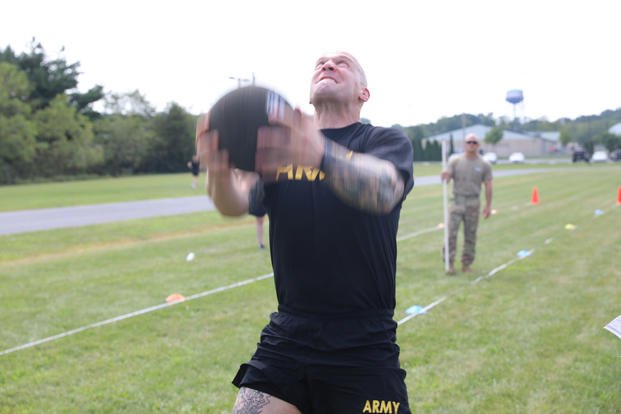Congress is set to direct the Army to boost fitness standards for most combat-arms jobs through a compromise defense policy bill unveiled Wednesday.
The must-pass National Defense Authorization Act, or NDAA, which sets funding and policy priorities for the Pentagon, directs the service to increase the baseline standards in the Army Combat Fitness Test, or ACFT, for ground troops including infantry, cavalry scouts and Special Forces within 18 months of the bill being signed into law by the president.
The direction is the latest in a yearslong slog Army planners have dealt with in finalizing the ACFT with lawmakers from both sides of the aisle being skeptical, turning the test into a political lightning rod. Soldiers started being graded on the ACFT in Oct. 2022.
Read Next: Army Veteran Battling Terminal Cancer Gets His Wish to Shoot a Tank One Last Time
The NDAA does not prescribe the new standards to be gender neutral, an about-face from what a draft version of the House version of the bill called for and what some Army planners were mulling behind the scenes.
That means men and women will likely be scored on different standards as they are now, something that has caught the ire of some Republicans on Capitol Hill in recent years. There is nothing preventing the Army from doing so, though.
The bill comes after months of negotiations between the House and Senate. It’s expected to easily pass through Congress before the end of the year and will then head to President Joe Biden’s desk to be signed into law.
Democratic Sens. Kirsten Gillibrand of New York and Richard Blumenthal of Connecticut put a pause on the test’s implementation in 2021, amid early test data showing half of the service’s women were failing the test during its beta period.
Army planners have eyed tweaks to the fitness test, including upping the standards for combat arms roles and potentially making them gender neutral, but lawmakers’ frequent debate and proposals have put any plans into a holding pattern.
The final NDAA dropped a controversial plan from Sen. Tom Cotton, R-Ark., which would have directed the service to revert back to the old fitness test, the Army Physical Fitness Test, or APFT.
The APFT was in use from 1980 to 2020 and is seen by all of the Army’s senior leadership and among much of the force as a poor assessment of physical fitness, only measuring push-ups, sit-ups and a two-mile run.
Cotton’s proposal caught immediate backlash from senior Army leaders, including Michael Grinston, who served as the top enlisted leader at the time, telling reporters that move would create “chaos.” In an interview with Military.com in October, Army Secretary Christine Wormuth said any move from Congress to scrap the ACFT would be “pretty problematic.”
Cotton has long blasted the ACFT standards, including calling them “pathetic” in a Senate hearing a year ago.
The new test is broadly seen in the force as easy to pass but difficult to get top scores, with the diversity of events demanding soldiers have diverse workout routines and be well-rounded athletes. The new test includes deadlifts, hand-release push-ups; a plank; a timed two-mile run; an event in which soldiers yeet a 10-pound ball as far as they can; and another event that involves sprints, carrying two 40-pound kettlebells and dragging a 90-pound sled.
“I’m a fan of the ACFT … I think we’ll be able to continue using [it] to change the culture of fitness,” Sergeant Major of the Army Michael Weimer told Military.com in an October interview.
Here are the Army occupations that would see increased fitness standards: 11A, 11B, 11C, 11Z, 12A, 12B, 13A, 13F, 18A, 18B, 18C, 18D, 18E, 18F, 18Z, 19A, 19C, 19D, 19K and 19Z.
The bill specifies “close combat” troops, not listing the physically demanding enlisted artillery role, otherwise known as a 13B, but artillery officers would see new standards. It wasn’t immediately clear if that was an oversight.
Related: Secretary Wormuth Wants the Army Combat Fitness Test to Stay as Congress Debates Its Fate
Story Continues
Please rate this CIBA article
Vote






